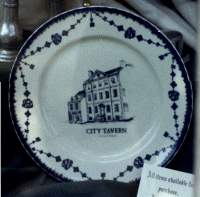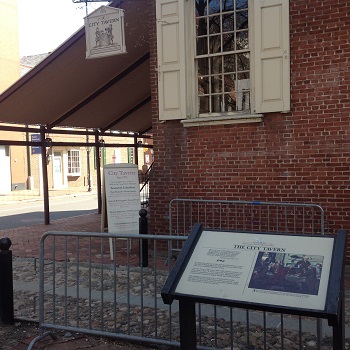City Tavern.

Here's where the elite came to eat.
City Tavern, also called the Merchants' Coffee House, was the political, social, and business center of the new United States. Jefferson, Adams, Franklin, and Paul Revere all ate here. The Declaration of Independence and The Constitution both owe much to the food and spirits consumed in this building. At the tavern, Bishop White led the Philadelphia Dancing Assembly. When the British occupied Philadelphia, they and their Tory sympathizers partied here. In 1789, George Washington celebrated here with 250 Philadelphia bluebloods prior to his inaugural in New York City.

The tavern was financed by Philadelphia's social elite who sold shares to subscribers. The Tavern was considered the finest establishment of its kind in the colonies. In one room, a patron might hear a concert or an opera; in another, the latest political news; in yet another the price of sows and sorghum. Traders exchanged promissory notes, bills of exchange, and conducted all manner of business in their own private chamber within the building. In 1834, a fire badly damaged the Merchant's Coffee House. The merchants decided they needed a new meeting spot and built the Merchant's Exchange across the street.
Eclipsed as a center of the business world, the Tavern was burned down in 1854. The building was reconstructed in 1975. After its reconstruction, the Tavern operated as a working restaurant for several years, but no longer serves food or drink and it is solely a historic site. The interior of the tavern is not currently open to the public.
- In 1774, Paul Revere, exhausted after a long ride (not the British Are Coming!long ride, however), brought the news here that Boston Harbor had been closed
- John Adams and Thomas Jefferson often met here to enjoy "a feast of reason and a flow of soul"
- Newspapers from the world over were once sold here
- The dining room was a favorite haunt of Benjamin Franklin
- Location: Second and Walnut Streets
- Built: 1773
- Architect: unknown
- Style: Federal
- Commissioned by: The Philadelphia social elite
- Official National Park Service Site


